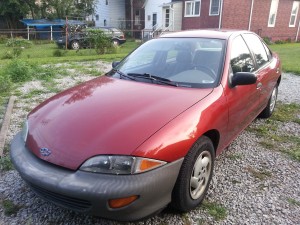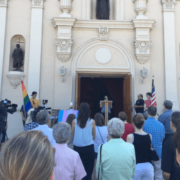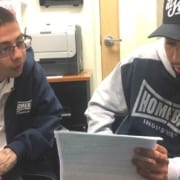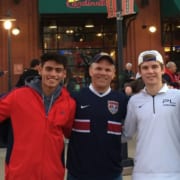Clifford’s Tale: A Jesuit Volunteer’s Inevitable First Challenge
 BY HARRY HUGGINS | May 4, 2015
BY HARRY HUGGINS | May 4, 2015
Clifford the small red car was a mule of a vehicle. His rusty red body sat low to the ground, he accelerated more like a bicycle than a car and his engine roared like a braying pack animal. I hated Clifford when I first saw him in our backyard, and I have a snarky Facebook post to prove it.
My community in Detroit got him in August, three weeks into our year as Jesuit Volunteers. He was our first car; his younger sister, Emily Elizabeth, would come weeks later. Clifford, a 1997 Chevy Cavalier sedan, had power nothing, no a/c and a trunk that did not open. He was slow, loud and ugly––a true ‘90s thug of a car.
I loved Clifford two weeks after meeting him (although I wouldn’t admit it for another two weeks). By then I realized he felt like a real mechanical machine, you could tell when he was happy with your driving and he was simple enough to remind me every day that, although we were privileged with our own vehicle, I was indeed a JV. He responded particularly well to my touch, twice jumping back to life in my hands after roommates deemed him deceased.
As much as we relied on Clifford, he relied on us to support him through surgeries on his wheels, electronics, battery, muffler, exhaust pipe and alternator. So when I learned in April that JVC’s budget couldn’t support him through another costly operation, my soul plummeted.
I’m flexible (mentally, not physically). That can be dangerous in a year like this, since it means I am often the most comfortable person in a room of intentional discomfort. When JVC forced me to say a premature goodbye to Clifford, however, I finally felt the stinging jolt of simple living.
Cars elicit emotional connections from most humans, positive or negative. Clifford and I were two ‘90s guys, just trying to survive the daily commute across Detroit’s series of potholes connected by rare patches of intact asphalt. Not until he was gone did I begin to recognize my feelings for Clifford as a rare unhealthy attachment. Letting go of Clifford was my first real exercise in cultivating a difficult–but necessary–detachment.
I was pissed at JVC for refusing to pay for one more fix on what I saw (and still see) as a valuable and trustworthy car. I was pissed at my community members for handling him recklessly, hastening his demise. I was pissed at Detroit for its terrible roads that beat him into the ground.
When the angry fog subsided, I thought about how many of the people I serve at my placement could have afforded the repairs, even in their wealthiest years? How would I have paid for this car even last year, working part-time at two jobs? How many of my neighbors lost cars this year to the lunar landscape that is Detroit’s roads?
Once I finally became uncomfortable, I discovered something foundational about simple living. I biked to work twice last week and experienced how biased Detroit winds are against my ride home. I learned to accept and solicit rides from friends and release my attachment to the powerful position of ride giver.
Eventually, I grew ready to let go of the many comforts I loved that Clifford provided: alone time before and after work, complete freedom of movement around Detroit, relative independent scheduling for my community. I now appreciate these things as the privileges they are.
I’m still not un-jolted. With one car for six people on as many different work and social schedules, my community spends most of our meals laying out transportation logistics for the next few days. We even lost our one car for a couple days this week, leaving us essentially quarantined in our neighborhood after work. Some may call this a blessing in disguise, but I think there’s too much grief tied up in it to be a blessing. It’s a challenge, but one that nourishes human growth if you let it.
Which is to say, it’s JVC.
Harry Huggins was born in Chicago and grew up in just outside the city in Oak Park, IL. He graduated from Fordham University with a degree in Communication and Media Studies (Journalism) and economics. For the past year since graduation, he worked part-time as a marketing and fundraising assistant at a small supportive housing nonprofit in Brooklyn, NY and part-time as the friendliest barista in a Times Square Starbucks. He can talk about coffee all day every day. Harry spends much of his time reading (mostly novels), tasting and writing about new beers, marathoning TV shows (especially British comedies, as he grew up in a very English household) and inventing board games and party games with his friends. Harry likes to travel as often as his life allows, as far as Japan, Greece and Dublin or as close as upstate New York. Harry is working with the Neighborhood Service Organization in Detroit, MI as a Community Involvement Coordinator.











Leave a Reply
Want to join the discussion?Feel free to contribute!